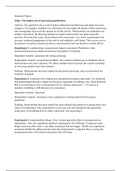Summary Papers:
Etkin: The hidden cost of personal quantification
Abstract: The quantified self is used to better understand our behaviour and make necessary
changes to live happier, healthier lives. But those devices might rob people of their enjoyment
and consequently decreased the amount we do the activity. Measurement can undermine our
intrinsic motivation. By drawing attention to output, measurement can make enjoyable
activities feel more like work, which reduces their enjoyment. As a result, measurement can
decrease continued engagement in the activity and subjective well-being. This occurs even in
the absence of explicit external incentives, measurement itself can thus have similar effects.
Experiment 1: examined how measurement impacts enjoyment. Prediction is that
measurement increases output but decrease enjoyment of colouring.
Dependent variable: enjoyment felt during colouring
Independent variable: measurement feedback. The control condition got no feedback of how
much pictures they have coloured. The other condition had to increase the counter according
to how many pictures they had coloured.
Findings: Measurement increased output but decreased enjoyment, and even decreased the
creativity of people.
Experiment 2: examined with walking how measurement impacts enjoyment. It is predicted
that measurement increases output but decreases enjoyment of walking. Also, Etkin predicted
that even choosing to wear a measurement device reduces enjoyment. -> if I choose to
measure something, it still decreases my enjoyment.
Dependent variable: enjoyment
Independent variable: choosing to wear a pedometer or being tasked with wearing a
pedometer.
Findings: Measurement increased output but again reduced enjoyment even among those who
chose to be measured. Also, enjoyment in every case, was not correlated with enjoyment,
doing more of something did not reduce enjoyment. Just measuring it.
Experiment 3: examined three things. Frist, it tested again the effect of measurement on
enjoyability. Also, the experiment explored consequences for wellbeing. If measures make
things seem more like work, it can make consumers feel less happy. Thirdly, the experiment
examined whether the effects persists when the measurement is optional. Does viewing the
measurement (free will) reduces enjoyment and well-being.
, Dependent: enjoyment, subjective well-being, did
walking feel like work:
Independent: control, measurement (asked to
measure), optional measurement (allowed to).
Findings: The experiment had three conditions:
control, measurement, optional (freewill
measurement. Again, measurement increased
output, enjoyment decreased between
measurement/optional and control. Importantly,
attending to measurement feedback made walking
feel more like work, even when this was optional.
Seeing the activity more like work drove the
negative (mediated) of measurement on
enjoyment.
Also, measurement also reduced subjective well-
being. Measurement, even when optional,
decreases happiness and overall satisfaction.
All effects are the same for measurement and
optional measurement condition.
Experiment 4: Measured two things. Firstly, framing and activity as work should attenuate
(mediating) the effect of measuring a task. Measurement should make a fun-framed task feel
more like work, but when it is framed as work from the start, the effect should be attenuated.
This should attenuate measurements effect on output. Secondly, when framed as fun, tracking
the task would reduce the subjective well-being. But framing a task as work to begin with
should not attenuate the negative effect of measuring on well-being.
Dependent: subjective well-being, enjoyment, extend to which the task felt like work.
Independent: Measurement (control vs measurement) and activity frame (control, fun, work)
Findings: main effect: measurement increased how much participants read, this is regardless
of framing and drawing attention to the output. Other main effect: measurement lead people to
enjoy the exercise less. This effect is attenuated if a work frame is used. Reading something
as work to begin with reduces enjoyment.
Measurement of control and fun-framed message made reading feel more like work and had a
negative effect on enjoyment. This indirect effect disappears in a work frame condition.
Manipulating activity frame moderated the effect on subjective well-being. Framing had no
main effect.





